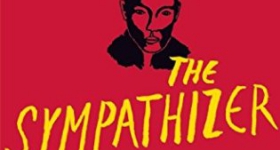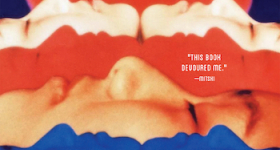Back in 2012, I came across a headline on Angry Asian Man, announcing that an APIA writer by the name of Ken Liu had just become the first person to sweep the Hugo, Nebula, and World Fantasy Awards for his short story "The Paper Menagerie." The post included a link to the full text of the story, reposted by the popular blog io9, so of course I hopped over to read it.
At first I was simply delighted by the whimsical setup of origami animals that came to life, but by the end of the poignant mother-son story, I was in tears. Immediately, I emailed Ken to ask him if I might interview him for Hyphen. Between both of our schedules, and several back-and-forths, I was finally able to pick his brain about everything from his process on writing the story to his upcoming translation project and his thoughts on Chinese science fiction. Ken, who is obviously incredibly smart, had a lot of really thoughtful things to say, so I'm pleased to finally provide you guys a shortened version of our conversation.
You can read "The Paper Menagerie" here, and keep an eye out for his translation of Liu Cixin's The Three-Body Problem (part of a trilogy) out from Tor Books this November.
--Karissa Chen, Fiction & Poetry Editor
Hyphen: You made headlines back in 2012 when your short story, “The Paper Menagerie,” swept the Hugo, Nebula, and World Fantasy Awards, becoming the first fiction piece to do so. The origami animals that the story focuses on pop so much on the page, I wondered if that premise appeared first, or if you began writing the animals, and then the rest of the story came out naturally.
Ken Liu: This is a good question, but I honestly don't remember. I'm a pantser rather than a planner, meaning that I don't plot my stories or outline them ahead of time. Rather, I draft by the seat of my pants.
I do remember seeing the paper animals in my head very vividly; so I want to say that was what got me started on this story, but that's just a guess. (This is not a claim that I was very original: every kid who'd been exposed to origami at a young age probably had fantasies about them coming alive at some point or another, and I know I've read a ton of stories where that happens.)
Hyphen: What is it about this story that you think resonated with people so much?
KL: I was surprised by the reception for this story. Like most stories by me, I wrote it for only one reader: me. What's the likelihood that other readers would react to these words the same way I did? None to slim, I imagined.
I've gotten plenty of negative feedback for the story. Some readers assert that the Chinese in this country do not face racism. Or they find it impossible to believe that a "free" colony like Hong Kong under the British could permit the kind of exploitation that the mother was subjected to. There's not much I can do about those kinds of reactions (I suppose I could suggest that they study a bit of Hong Kong's history and the reality of the Chinese experience in America, but I never argue with readers because it's always useless.).
But I'm thankful that for many readers, this story apparently speaks to them and they find themselves empathizing with the characters. I'm incredibly honored and moved by the many positive reactions readers have shared with me. But I would never presume to claim to know why readers do or do not like my stories.
Hyphen: Taking a step back to think about your body of work as a whole, is there any one story that’s particularly meaningful to you?
KL: Oh, this is not difficult at all. The story that I'm most proud of is "The Man Who Ended History," a novella. It's a time-travel story of sorts about a technology that allows people in the present to witness the atrocities of the past. A historian and a physicist, a husband-wife team, use it to reveal the war crimes committed by Unit 731 of the Japanese Imperial Army in Northeast China during World War Two, They set off a political firestorm that ends in personal tragedy.
I wrote it in part to commemorate Iris Chang, who killed herself after writing about atrocities committed by the Japanese Empire during World War II, and also to explore the complexities of history and historiography.
Hyphen: Tor Books is going to publish the first book of Chinese science fiction writer Liu Cixin's immensely popular Three Body Trilogy, The Three-Body Problem, this fall. I understand that you will be the translator for both Book I and Book III of the trilogy. What drew you to these books? Had you read the books in Chinese prior to this translation job?
KL: The trilogy is incredibly popular in China, and hundreds of thousands of copies have been sold. I've been a fan of Liu's work for a while and read the books along with his short fiction before being asked to do the translation.
I will limit my comments here to Book I to avoid giving away too many spoilers. Liu's story is appealing in multiple ways. It's a story of grand imagination in the tradition of hard scifi masters like Arthur C. Clarke, and it engages with big ideas, with the problems facing all of humanity. At the same time, it tells this big story using details that are rooted in China's ancient and recent history, through images and references that may be unfamiliar to some Western readers but are very emotionally powerful and evocative for me, as a culturally Chinese reader. Finally, it's just a fun and exciting adventure story, and we can all use more adventure.
Hyphen: I think one of the things that draws people to science fiction is that it allows us to us to ponder questions of society, culture, and humanity away from the reality of our particular world. Does Chinese science fiction--and in particular, Liu Cixin's work--imagine worlds that reveal a different set of concerns than what we might worry about in America?
KL: I think American readers are going to be particularly interested in the way Liu represents the plight of the ordinary Chinese intellectual and the place of China in the world. To make a bit of a gross generalization, I think most American readers think of contemporary China as a frightening dystopia, full of problems brought about by rapid development and urbanization, as well as an oppressive government and a hidebound culture that have few, if any, redeeming qualities. Given this mostly negative view of China, most American readers probably also have certain ideas about how the Chinese view their own society and their relationship to the West—mostly, these ideas deprive the Chinese of agency and cast the West in the role of savior, with strong whiffs of the colonial legacy.
It's possible to read Liu's work this way and to simply judge it based on how closely it hews to this Western ideal, but I think that would be a mistake. It's far more rewarding to try to push aside these images and, as much as possible, approach Liu's work with fresh eyes.
For example, Liu's work contains a devastating critique of the Cultural Revolution, but it does so in a way that would probably be surprising to American readers. Most Americans who know vaguely of the Cultural Revolution view it as a time of simple, senseless brutality driven from the top by the Communist leadership. The reality was far more complicated, and Liu really delves into the mindset of the time and makes the horrors of the Cultural Revolution real to the reader in a visceral way that makes blaming a few individuals impossible. The root of evil goes much deeper.
Liu also represents China's contemporary problems and internal conflicts in a way that gives the Chinese far more agency and complexity and self-determination than a typical Western narrative. Liu's work is not character-driven, per se. It's far more interested in ideas. Yet, his Chinese characters are far more nuanced and layered and interesting than the cartoonish representations you get in most Western narratives.
The point is, if you don't go into the work with a rigid mental framework constructed from "collectivism vs. individualism" and "authoritarianism vs. freedom and democracy," you'll be able to see a different worldview and to appreciate a different way of thinking about our world.
Finally, it's important to keep in mind that the "Chinese-ness" of Liu's work is really tangential, in a manner of speaking. The Three-Body Problem is a first-contact story, but it's not like any first-contact story I've ever read. It's about humanity, all of humanity, under existential threat, and it's about the reaction of our species to an unimaginable, unprecedented crisis. Liu explores big ideas on a big canvas, and honestly, the differences between "China" and "the United States" should seem insignificant by the time you finish the book.
Hyphen: What were some of the other challenges in translating this work?
KL: Besides the cultural/historical issues I alluded to above, Liu also employs some literary techniques that American genre readers may find odd or off putting. For example, among American genre fiction writers, it's common to hear the mantra of "one scene, one point-of-view." Liu does not follow this rule and often switches point-of-view within a scene to achieve the effect he wants. If you follow the rules rigidly, you'd say Liu engages in "head hopping," which is supposed to be confusing for readers.
I suppose the safe thing for me to do would have been to rewrite Liu's text to follow this contemporary American genre convention, but it felt wrong. It felt like a violation of the integrity of the text. Moreover, since I hate that "one scene, one point-of-view" convention and never follow it in my own work in any event, I really felt uncomfortable imposing it on someone else's text.
In the end, I decided to just handle everything in a way that I felt respected the integrity of the text and the original author's vision. My choices would perhaps require the Anglophone reader to come and meet me part of the way—read some footnotes and get used to some unfamiliar literary conventions (instead of dismissing them outright)—but isn't that part of the joy of reading a translation? A good translation, I've always felt, should not feel like something that could have been written in English in the first place. It should have a hint of strangeness, of a vision and mode of thinking not entirely like the Anglophone reader's own home culture. I do want to note that by "strangeness" I don't mean "exoticism." The point here isn't to condescend, but to transcend.
Hyphen: What’s on the horizon for you?
KL: I sold my epic fantasy series, The Dandelion Dynasty, to Saga Press, Simon & Schuster’s new genre imprint. The first book in the series, The Grace of Kings, is scheduled for release in 2015, and I’m really excited about that. The book is a re-imagining of some historical legends about the Han Dynasty in a fantasy setting, and I’m hoping readers who like epic fantasy and who are leery of the genre will both enjoy the series. This is a story about friendship, love, revolutions, multiple empires, magical whales, silkpunk airships, and steam-driven tunneling machines. I tried to do something new here and, hopefully, the effort will connect with readers.
Saga Press will also put out a collection of my short stories as they publish my novel.
Finally, I’m translating the debut dystopian novel The Waste Tide, by my friend Chen Qiufan, one of China’s most critically acclaimed science fiction writers of the younger generation. I think it’s an amazing work that combines post-cyberpunk imagery, a global perspective, and punchy, forceful, fresh and crackling prose. I can’t wait to share it with Anglophone readers.
***
Ken Liu (http://kenliu.name) is an author and translator of speculative fiction, as well as a lawyer and programmer. A winner of the Nebula, Hugo, and World Fantasy Awards, he has been published in The Magazine of Fantasy & Science Fiction, Asimov’s, Analog, Clarkesworld, Lightspeed, and Strange Horizons, among other places. He lives with his family near Boston, Massachusetts.
Ken’s debut novel, The Grace of Kings, the first in a silkpunk epic fantasy series, will be published by Saga Press, Simon & Schuster’s new genre fiction imprint, in April 2015. Saga will also publish a collection of his short stories.










Comments